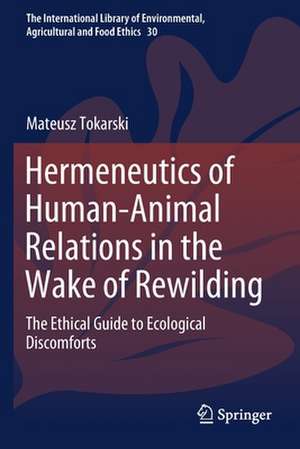Hermeneutics of Human-Animal Relations in the Wake of Rewilding: The Ethical Guide to Ecological Discomforts: The International Library of Environmental, Agricultural and Food Ethics, cartea 30
Autor Mateusz Tokarskien Limba Engleză Paperback – 14 aug 2020
| Toate formatele și edițiile | Preț | Express |
|---|---|---|
| Paperback (1) | 451.48 lei 43-57 zile | |
| Springer International Publishing – 14 aug 2020 | 451.48 lei 43-57 zile | |
| Hardback (1) | 531.07 lei 43-57 zile | |
| Springer International Publishing – 30 mai 2019 | 531.07 lei 43-57 zile |
Din seria The International Library of Environmental, Agricultural and Food Ethics
- 15%
 Preț: 707.96 lei
Preț: 707.96 lei -
 Preț: 451.76 lei
Preț: 451.76 lei - 18%
 Preț: 731.10 lei
Preț: 731.10 lei - 18%
 Preț: 744.53 lei
Preț: 744.53 lei - 18%
 Preț: 899.87 lei
Preț: 899.87 lei - 18%
 Preț: 1831.27 lei
Preț: 1831.27 lei - 15%
 Preț: 644.82 lei
Preț: 644.82 lei - 15%
 Preț: 643.16 lei
Preț: 643.16 lei - 18%
 Preț: 947.04 lei
Preț: 947.04 lei - 18%
 Preț: 953.20 lei
Preț: 953.20 lei - 15%
 Preț: 646.62 lei
Preț: 646.62 lei - 15%
 Preț: 646.75 lei
Preț: 646.75 lei - 18%
 Preț: 1116.40 lei
Preț: 1116.40 lei - 15%
 Preț: 643.99 lei
Preț: 643.99 lei - 18%
 Preț: 953.65 lei
Preț: 953.65 lei - 15%
 Preț: 645.28 lei
Preț: 645.28 lei - 15%
 Preț: 637.28 lei
Preț: 637.28 lei - 18%
 Preț: 786.66 lei
Preț: 786.66 lei - 15%
 Preț: 644.30 lei
Preț: 644.30 lei -
 Preț: 398.74 lei
Preț: 398.74 lei - 18%
 Preț: 902.69 lei
Preț: 902.69 lei - 24%
 Preț: 697.63 lei
Preț: 697.63 lei -
 Preț: 388.52 lei
Preț: 388.52 lei - 20%
 Preț: 570.97 lei
Preț: 570.97 lei - 18%
 Preț: 784.61 lei
Preț: 784.61 lei - 15%
 Preț: 527.79 lei
Preț: 527.79 lei - 24%
 Preț: 635.50 lei
Preț: 635.50 lei - 15%
 Preț: 647.08 lei
Preț: 647.08 lei
Preț: 451.48 lei
Nou
Puncte Express: 677
Preț estimativ în valută:
86.39€ • 90.43$ • 71.90£
86.39€ • 90.43$ • 71.90£
Carte tipărită la comandă
Livrare economică 31 martie-14 aprilie
Preluare comenzi: 021 569.72.76
Specificații
ISBN-13: 9783030189730
ISBN-10: 3030189732
Pagini: 228
Ilustrații: XI, 228 p. 1 illus.
Dimensiuni: 155 x 235 mm
Greutate: 0.35 kg
Ediția:1st ed. 2019
Editura: Springer International Publishing
Colecția Springer
Seria The International Library of Environmental, Agricultural and Food Ethics
Locul publicării:Cham, Switzerland
ISBN-10: 3030189732
Pagini: 228
Ilustrații: XI, 228 p. 1 illus.
Dimensiuni: 155 x 235 mm
Greutate: 0.35 kg
Ediția:1st ed. 2019
Editura: Springer International Publishing
Colecția Springer
Seria The International Library of Environmental, Agricultural and Food Ethics
Locul publicării:Cham, Switzerland
Cuprins
Chapter 1. Introduction: the Return of Wildlife.- Chapter 2. Ecological Discomforts in Environmental Thought.- Chapter 3. Interests, Costs, Benefits, and the Social Complexity of Discomforts.- Chapter 4. Wildness and the Preconditions for Meaningfulness of Nature.- Chapter 5. Discomforting Encounters with Nature as Moral Experiences.- Chapter 6. Individual Sacrifices and the Flourishing of Ecosystems.- Chapter 7. Towards a Wilder Community.- Chapter 8. Practicing Coexistence.- Chapter 9. Summary and General Conclusions.
Notă biografică
Mateusz Tokarski, PhD., is currently an independent researched and writer. He holds a BA in Film and Theater Studies from London Metropolitan University, an MA in Cognitive Semiotics from Aarhus University and a PhD in Philosophy from Radboud University Nijmegen. His main research interests center around human-animal relations, the role of wildness in modern culture, and the processes of meaning-making approached from both cognitive-scientific and hermeneutic perspectives. In addition, he is interested in the role that arts can play in developing environmental awareness and in restructuring human relationship with the non-human world – a topic he engages with through his own experiments with storytelling. He has published articles dealing with rewilding, wildlife conflicts, and reconnecting to nature. Recently, he has completed his PhD during which he carried out a series of hermeneutic studies of the ways people make sense of discomforting encounters with wildlife.
Textul de pe ultima copertă
In consequence of significant social, political, economic, and demographic changes several wildlife species are currently growing in numbers and recolonizing Europe. While this is rightly hailed as a success of the environmental movement, the return of wildlife brings its own issues. As the animals arrive in the places we inhabit, we are learning anew that life with wild nature is not easy, especially when the accumulated cultural knowledge and experience pertaining to such coexistence have been all but lost. This book provides a hermeneutic study of the ways we come to understand the troubling impacts of wildlife by exploring and critically discussing the meanings of 'ecological discomforts'. Thus, it begins the work of rebuilding the culture of coexistence. The cases presented in this book range from crocodile attacks to mice infestations, and their analysis consequently builds up an ethics that sees wildlife as active participants in the shaping of human moral and existential reality. This book is of interest not only to environmental philosophers, who will find here an original contribution to the established ethical discussions, but also to wildlife managers, and even to those members of the public who themselves struggle to make sense of encounters with their new wild neighbors.
Caracteristici
Provides a unique, in-depth and systematic discussion of the role of wildness and 'ecological discomforts' in modern culture Makes a substantial contribution to the nascent field of environmental hermeneutics, illustrating its practical application Addresses the contentious and pressing issues of wildlife impacts and conflicts, which have gained high societal relevance in the context of recent attempts at ecological restoration
